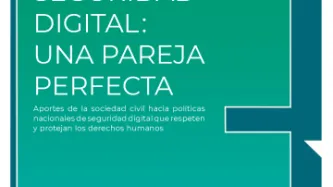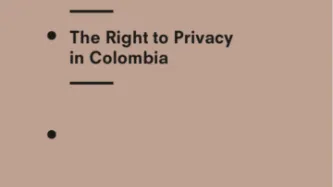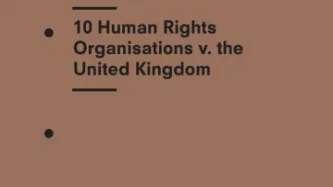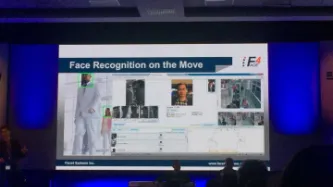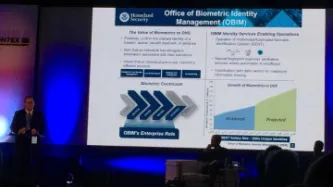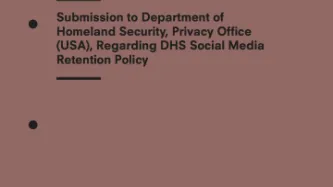Search
Content type: Examples
Documents submitted as part of a 2015 US National Labor Relations Board investigation show that Walmart, long known to be hostile to unions, spied on and retaliated against a group of employees who sought higher wages, more full-time jobs, and predictable schedules. In combating the group, who called themselves the Organization United for Respect at Walmart (OUR Walmart), Walmart hired an intelligence-gathering service from Lockheed Martin, contacted the FBI, and set up an internal Delta team…
Content type: Long Read
This piece was originally published in Lawfare in April 2018
The United States is party to a number of international intelligence sharing arrangements—one of the most prominent being the so-called “Five Eyes” alliance. Born from spying arrangements forged during World War II, the Five Eyes alliance facilitates the sharing of signals intelligence among the U.S., the U.K., Australia, Canada and New Zealand. The Five Eyes countries agree to exchange by default all signals intelligence…
Content type: News & Analysis
El 10 de mayo de 2018, en el marco del 30º período de sesiones del Examen Periódico Universal (EPU) en el Consejo de Derechos Humanos de las Naciones Unidas, toca la revisión de Colombia, lo que es una oportunidad Colombia y otros Estados para declarar qué acciones han tomado para mejorar la situación de derechos humanos en sus propios países, para cumplir sus obligaciones internacionales en la materia.
Colombia se encuentra actualmente en un punto de inflexión, debido al proceso de transición…
Content type: News & Analysis
On 10 May 2018, Colombia’s human right record will be reviewed as part of the 30th session of the Universal Periodic Review (UPR), under the auspices of the Human Rights Council, which provides the opportunity for each State to declare what actions they have taken to improve the human rights situations in their countries and to fulfil their human rights obligations.
Colombia is at an important turning point in its history as it transitions from four decades of conflict. This provides…
Content type: Report
La seguridad digital es una discusión crítica y hay que reconocer que la sociedad civil y los grupos de interés público no han sido suficientemente considerados. Como respuesta, varias organizaciones de la sociedad civil de América Latina se unieron para presentar informes que recuerdan a las entidades estatales responsables de formulación de políticas públicas que la seguridad digital debe tener en cuenta la seguridad de las personas y los derechos humanos. Presentamos la serie, Derechos…
Content type: News & Analysis
Written by Karisma Foundation
7:03: Catalina leaves her apartment and a security camera follows her down the hall, another one observes her in the elevator while she fixes her hair. As she exits the building, the warden tells her she doesn’t have to fix her hair because she is already pretty as she is. She gets to the parking lot where another two cameras look at her while she gets into her car.
8:00: She is heading to an open data workshop organized by the Colombian government in a…
Content type: Advocacy
Este informe de terceras partes interesadas es una contribución escrita presentada por Dejusticia, Fundación Karisma y Privacy International (PI). Dejusticia es una organización de derechos humanos colombiana que brinda conocimientos especializados sobre derechos humanos. Fundación Karisma es una organización de la sociedad civil colombiana que busca dar respuesta a las oportunidades y a las amenazas que surgen en el contexto de la tecnología para el desarrollo para el ejercicio de los derechos…
Content type: Advocacy
This stakeholder report is a submission by Dejusticia, Fundación Karisma and Privacy International (PI). Dejusticia is a Colombian human rights organization that provides expert knowledge on human rights. Fundación Karisma is a Colombian civil society organization that seeks to respond to the opportunities and threats that arise in the context of ‘technology for development’ for the exercise of human rights. PI is a human rights organisation that works to advance and promote the right to…
Content type: News & Analysis
Simply put, the National Security Agency is an intelligence agency. Its purpose is to monitor the world's communications, which it traditionally collected by using spy satellites, taps on cables, and placing listening stations around the world.
In 2008, by making changes to U.S. law, the U.S. Congress enabled the NSA to make U.S. industry complicit in its mission. No longer would the NSA have to rely only on international gathering points. It can now go to domestic companies who hold massive…
Content type: Long Read
“FISA section 702 reauthorisation” might not sound like it matters very much to very many people, but it’s pretty dramatic: in short, last month US lawmakers rejected a bill which would have provided protections for US citizens – constitutionally protected against being spied on by US spy agencies – from being spied on, and instead voted to extend their powers to do so.
In the fall out, it’s worth considering just why such mass surveillance powers are such a big issue, how the promise of…
Content type: Long Read
Privacy International is celebrating Data Privacy Week, where we’ll be talking about privacy and issues related to control, data protection, surveillance and identity. Join the conversation on Twitter using #dataprivacyweek.
Exercising the right to privacy extends to the ability of accessing and controlling our data and information, the way it is being handled, by whom, and for what purpose. This right is particularly important when it comes to control of how States perform these activities.…
Content type: News & Analysis
This post was written by PI Policy Officer Lucy Purdon.
In 1956, US Presidential hopeful Adlai Stevenson remarked that the hardest part of any political campaign is how to win without proving you are unworthy of winning. Political campaigning has always been a messy affair and now the online space is where elections are truly won and lost. Highly targeted campaign messages and adverts flood online searches and social media feeds. Click, share, repeat; this is what political engagement looks…
Content type: News & Analysis
7 July 2016
It has been said is that we pay for free services with our personal data. Now, the Privacy Shield exponentially expands this truth and we are paying for the cost of U.S. political dysfunction combined with EU complacency with our privacy. More than four months after the first EU-US Privacy Shield was published on 29 February 2016, a new version has been leaked. Remarkably, it is expected to be adopted.
Four months, two opinions by group of EU data protection…
Content type: Press release
The release of a new report by Privacy International exposes Colombia's intelligence agencies' previously unknown history of developing communications surveillance capabilities outside of lawful authority.
The report “Shadow State: Surveillance law and order in Colombia” reveals, via previously unreleased documents, the Colombian police agencies' and intelligence services' long history developing surveillance systems. Rather than building a well-regulated system of surveillance after Colombia…
Content type: News & Analysis
The elections in our midst here, there, and everywhere are increasingly resulting in governments who introduce policies that result in leaps backwards for dignity, equality, civil liberties, and the rule of law. Whether it is Poland or the Philippines, governments are overriding essential safeguards.
This week Britain’s proposed surveillance legislation took another step toward normalising mass surveillance. The United States of America has long promoted mass surveillance and maintains its…
Content type: Long Read
This piece was originally published in Just Security in November 2017.
The upcoming expiration of Section 702 of the Foreign Intelligence Surveillance Act (FISA) has launched a fresh wave of debate on how the statute’s “backdoor search loophole” allows the U.S. government to access Americans’ communications by searching information gathered on foreign intelligence grounds without a warrant. But while discussion about domestic information sharing is important, a critical…
Content type: News & Analysis
For further information on timeline and case history, read this briefing.
Arguments
The argument were based on the written submissions of the parties. The oral statements summarised key points in these submissions.
The submissions can be found on PI’s website under Legal Action. In terms of today’s proceedings (these are now available through webcast)
Counsel for the UK Government, James Eadie QC started off proceedings, his opening arguments were: 1) The issues are of…
Content type: Press release
The European Court of Human Rights will hear a landmark case on surveillance tomorrow (7 November) as part of a challenge to the lawfulness of the UK’s surveillance laws and its intelligence agencies’ mass surveillance practices.
See the attached briefing for case background and historical information.
The case, described by campaigners as a “watershed moment for people’s privacy and freedom of expression across the world”, is being brought by Amnesty International, Liberty, Privacy…
Content type: Press release
Privacy International has filed a federal lawsuit seeking to compel disclosure of records relating to a 1946 surveillance agreement between the US, UK, Australia, Canada and New Zealand, known as the “Five Eyes alliance”.* We are represented by Yale Law School’s Media Freedom and Information Access Clinic (MFIA). The most recent publicly available version of the Five Eyes surveillance agreement dates from 1955. Our complaint was filed before the U.S. District Court for the District of Columbia…
Content type: News & Analysis
From unlocking a smartphone or getting through an airport, the use of an iris, fingerprint, or your face for identity verification is already widespread, and the market for it is set to rocket. While the technology is not new, its capability and uses are. As people, biometrics offers us much, but risks ultimately only serve data-hungry industries and government agencies: in the name of efficiency and security, it has the potential to bring chaos and vulnerability.
Obtaining reliable…
Content type: News & Analysis
The United States Department of Homeland Security (DHS) has contracted one of the world’s largest arms companies to manage a huge expansion of its biometric surveillance programme.
According to a presentation seen by Privacy International, the new system, known as Homeland Advanced Recognition Technology (HART), will scoop up a whopping 180 million new biometric transactions per year by 2022.
It will replace the Automated Biometric Identification System (IDENT), which currently stores…
Content type: Advocacy
Privacy International wishes to raise serious concerns regarding the proposal to expand immigration records to include social media handles, associated identifiable information and search results. Specifically, in relation to the current request for comments Docket Number DHS 2017 0038, we object to the Department for Homeland Security proposal to update record source categories to include “publicly available information obtained from the internet”, “commercial data providers” and from “…
Content type: Press release
Privacy International, in partnership with 30+ national human rights organisations, has today written to national intelligence oversight bodies in over 40 countries seeking information on the intelligence sharing activities of their governments.
Countries may use secret intelligence sharing arrangements to circumvent international and domestic rules on direct surveillance. These arrangements can also lead to the exchange of information that can facilitate human rights abuses,…
Content type: Advocacy
Privacy International has today submitted comments to a U.S. government consultation on whether the US Department of Homeland Security (DHS) should keep the social media details of individuals travelling to the US in so-called “Alien Files” documenting all immigrants.
We’ve urged that they don’t, and that they review and stop all similar social media surveillance by the DHS.
The systematic surveillance of social media is an increasingly dangerous trend …
Content type: News & Analysis
This blog was written by Fundación Karisma, a member of the Privacy International Network. It does not necessarily reflect the views or position of Privacy International.
The Colombian General Prosecutor said recently that the blocking of IMEI is not working. He is talking about a registry created in 2011 that aims to reduce cellphone theft by blocking reportedly stolen phones of Colombian networks.
Fundación Karisma has been following this program and now, after six years…
Content type: Long Read
This piece was originally published in Just Security in August 2017
We recently published an analysis in Lawfare of the United Kingdom’s surveillance framework as it relates to the proposed U.S.-U.K. agreement for cross-border law enforcement data requests. Implementing the U.S.-U.K. agreement is subject to passage of draft legislation proposed by the Justice Department to Congress in July 2016 (“U.S. DOJ legislation”), which will set standards that approved partners like the U.K.…
Content type: Long Read
This piece was originally published in Lawfare in July 2017.
The United Kingdom has been a key partner in the United States’ efforts to reform the process that law enforcement officials use to make cross-border requests for data. These efforts address both foreign governments’ requests for data stored in the U.S. and reciprocal requests by the U.S. government for data stored abroad. As part of these efforts, the U.S. and the U.K. have negotiated a draft bilateral agreement (“U…
Content type: Long Read
This piece was originally published in Lawfare in May 2017.
This post is part of a series written by participants of a conference at Georgia Tech in Surveillance, Privacy, and Data Across Borders: Trans-Atlantic Perspectives.
Cross-border law enforcement demands have become increasingly important to law enforcement in the digital age. Digital evidence in one jurisdiction—such as the United States—is often necessary to investigate a crime that has effects in another jurisdiction…
Content type: Long Read
Disclaimer: This piece was written in April 2017. Since publishing, further information has come out about Cambridge Analytica and the company's involvement in elections.
Recently, the data mining firm Cambridge Analytica has been the centre of tons of debate around the use of profiling and micro-targeting in political elections. We’ve written this analysis to explain what it all means, and the consequences of becoming predictable to companies and political campaigns.
What does…
Content type: News & Analysis
This week the United States Congress voted to strip away one of the country’s few safeguards of the right to privacy by repealing rules which would have limited internet service provider’s ability to use or share customers’ data without customers’ approval.
Meanwhile, last week, 6,500 kilometers away in Geneva, the United Nations Human Rights Council called on states to strengthen customers’ control over their data and develop legislation to address harm from the sale or corporate sharing of…




